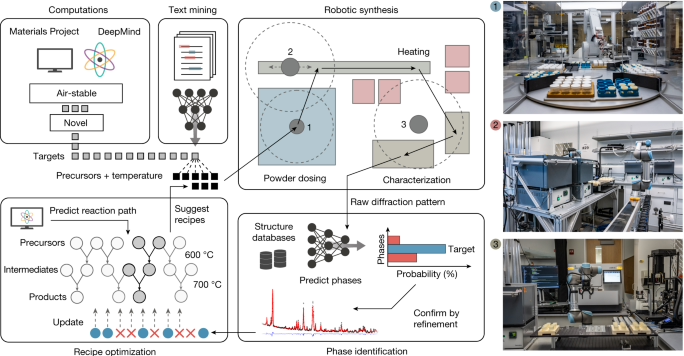 Technology peripherals
Technology peripherals
 AI
AI
 Google has used DeepMind AI to analyze and predict thousands of new materials
Google has used DeepMind AI to analyze and predict thousands of new materials
Google has used DeepMind AI to analyze and predict thousands of new materials

Google-owned DeepMind has used artificial intelligence (AI) to predict the structures of more than 2 million new materials, a breakthrough that will drive real-world technological improvements. The news was released on November 30th
The relevant research results were published in "Nature" on Wednesday local time under the title "An autonomous laboratory for the accelerated synthesis of novel materials". Attached to this site is DOI:10.1038/s41586-023-06734-w.
DeepMind researchers noted in a paper that based on their hypothesis, most of the nearly 400,000 material designs could be rapidly produced under laboratory conditions. This research is expected to help produce better-performing batteries, solar panels and computer chips
DeepMind said that after using AI to predict the stability of these new materials, they will take the next step in their research The focus shifts to predicting how easy it will be to synthesize these materials in the laboratory

#What needs to be rewritten is: ▲ Source: Nature
Actually, The discovery and synthesis of new materials is actually a very expensive and time-consuming process. For example, the commercial application of lithium-ion batteries that we can see everywhere today took about 20 years, during which countless costs and efforts were consumed.
"DeepMind researcher Ekin Dogus Cubuk said that we hope to shorten this 10 to 20 years to a more manageable range through experiments, autonomous synthesis and huge improvements in machine learning models."
According to reports, DeepMind’s artificial intelligence is trained based on Materials Project data. Materials Project is an international research organization established at Lawrence Berkeley National Laboratory in 2011. It has researched about 50,000 known materials. The company said it will share the data with the research community to accelerate materials discovery. Further breakthroughs
“The industry is often somewhat risk-averse when it comes to cost increases, and new materials often take a while to become cost-effective.” Kristin Persson, director of Materials Project, said, “If If we can further shorten this time, that will be a real breakthrough."
The above is the detailed content of Google has used DeepMind AI to analyze and predict thousands of new materials. For more information, please follow other related articles on the PHP Chinese website!

Hot AI Tools

Undresser.AI Undress
AI-powered app for creating realistic nude photos

AI Clothes Remover
Online AI tool for removing clothes from photos.

Undress AI Tool
Undress images for free

Clothoff.io
AI clothes remover

Video Face Swap
Swap faces in any video effortlessly with our completely free AI face swap tool!

Hot Article

Hot Tools

Notepad++7.3.1
Easy-to-use and free code editor

SublimeText3 Chinese version
Chinese version, very easy to use

Zend Studio 13.0.1
Powerful PHP integrated development environment

Dreamweaver CS6
Visual web development tools

SublimeText3 Mac version
God-level code editing software (SublimeText3)

Hot Topics
 1387
1387
 52
52
 How to get logged in user information in WordPress for personalized results
Apr 19, 2025 pm 11:57 PM
How to get logged in user information in WordPress for personalized results
Apr 19, 2025 pm 11:57 PM
Recently, we showed you how to create a personalized experience for users by allowing users to save their favorite posts in a personalized library. You can take personalized results to another level by using their names in some places (i.e., welcome screens). Fortunately, WordPress makes it very easy to get information about logged in users. In this article, we will show you how to retrieve information related to the currently logged in user. We will use the get_currentuserinfo(); function. This can be used anywhere in the theme (header, footer, sidebar, page template, etc.). In order for it to work, the user must be logged in. So we need to use
 How to elegantly obtain entity class variable names to build database query conditions?
Apr 19, 2025 pm 11:42 PM
How to elegantly obtain entity class variable names to build database query conditions?
Apr 19, 2025 pm 11:42 PM
When using MyBatis-Plus or other ORM frameworks for database operations, it is often necessary to construct query conditions based on the attribute name of the entity class. If you manually every time...
 Java BigDecimal operation: How to accurately control the accuracy of calculation results?
Apr 19, 2025 pm 11:39 PM
Java BigDecimal operation: How to accurately control the accuracy of calculation results?
Apr 19, 2025 pm 11:39 PM
Java...
 How to solve the problem of username and password authentication failure when connecting to local EMQX using Eclipse Paho?
Apr 19, 2025 pm 04:54 PM
How to solve the problem of username and password authentication failure when connecting to local EMQX using Eclipse Paho?
Apr 19, 2025 pm 04:54 PM
How to solve the problem of username and password authentication failure when connecting to local EMQX using EclipsePaho's MqttAsyncClient? Using Java and Eclipse...
 How to properly configure apple-app-site-association file in pagoda nginx to avoid 404 errors?
Apr 19, 2025 pm 07:03 PM
How to properly configure apple-app-site-association file in pagoda nginx to avoid 404 errors?
Apr 19, 2025 pm 07:03 PM
How to correctly configure apple-app-site-association file in Baota nginx? Recently, the company's iOS department sent an apple-app-site-association file and...
 How to package in IntelliJ IDEA for specific Git versions to avoid including unfinished code?
Apr 19, 2025 pm 08:18 PM
How to package in IntelliJ IDEA for specific Git versions to avoid including unfinished code?
Apr 19, 2025 pm 08:18 PM
In IntelliJ...
 How to efficiently query large amounts of personnel data through natural language processing?
Apr 19, 2025 pm 09:45 PM
How to efficiently query large amounts of personnel data through natural language processing?
Apr 19, 2025 pm 09:45 PM
Effective method of querying personnel data through natural language processing How to efficiently use natural language processing (NLP) technology when processing large amounts of personnel data...
 How to process and display percentage numbers in Java?
Apr 19, 2025 pm 10:48 PM
How to process and display percentage numbers in Java?
Apr 19, 2025 pm 10:48 PM
Display and processing of percentage numbers in Java In Java programming, the need to process and display percentage numbers is very common, for example, when processing Excel tables...



